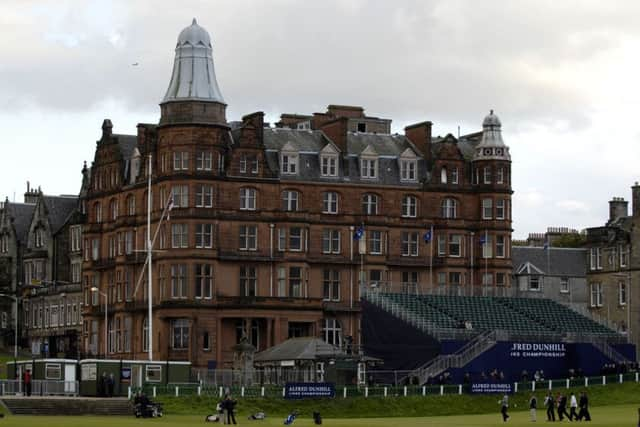Donald Trump’s Scottish finances just got even more interesting – Martyn McLaughlin
This article contains affiliate links. We may earn a small commission on items purchased through this article, but that does not affect our editorial judgement.
For anyone who believes that Donald Trump’s portfolio of loss-making properties in Scotland is a sideshow to the investigations threatening to ensnare his presidency, a report in the weekend edition of the New York Times should be required reading.
In it, the newspaper’s finance editor, David Enrich, wrote of how in early 2016, as his campaign for the White House was in full tilt, the Trump Organisation tried to extend an existing loan facility with Deutsche Bank against its Doral resort in Miami by nearly £8m in order to pay for work at Trump Turnberry in South Ayrshire.
Advertisement
Hide AdAdvertisement
Hide AdAn internal committee of the bank, the report went on, rejected Trump’s request in March 2016, deeming the proposal too “risky”.


The bank has declined to comment on the story, while Amanda Miller, senior vice-president of marketing and communications at the Trump Organisation, issued a vehement denial.
“This story is absolutely false,” she said. “We bought Trump Turnberry without any financing and put tens of millions of dollars of our own money into the renovation, which began in 2014. At no time was any money needed to finance the purchase or the refurbishment of Trump Turnberry.”
Those three sentences require unpacking. Firstly, Ms Miller does not explicitly address whether the Trump Organisation tried to secure a loan from Deutsche Bank, which has long been one of its key lenders.
Secondly, her claim that “tens of millions of dollars” have been spent on Turnberry is surprisingly conservative, given the resort’s website boasts of how the Trump Organisation has invested “over £200m” to “completely restore and revamp” it. But fact-checking some of Trump’s more excitable expenditure claims feels like an obsolete, even trivial pursuit nowadays, despite the novelty of one of his executives bucking the company’s line.
What is important about the disputed report is how it may cast some light on how Trump has financed his Scottish resorts. For seasoned Trump watchers, this has long been a mystery, particularly where Turnberry is concerned.
By the end of 2015, its parent company, Golf Recreation Scotland Limited, had received loans totalling £63 million from a New York trust controlled by Trump and Allen Weisselberg, the Trump Organisation’s longstanding chief financial officer. A year later, the loan total had reached £112m. It still stands at £107m today.
Was that money generated from Trump’s other businesses? It is impossible to say. What is beyond dispute is that Trump has tried – and failed – in the past to borrow money for business deals in Scotland.
Advertisement
Hide AdAdvertisement
Hide AdLast summer, I ran an investigation into how Trump attempted to buy Hamilton Hall, the grand 19th century red sandstone building overlooking the 18th green of the Old Course in St Andrews.
His determined pursuit of the landmark – he made at least four rejected offers – coincided with the first tentative years of his first Scottish golf resort in Aberdeenshire.
At the time – and how quaint it seems now – both Trump himself and George Sorial, executive vice president and counsel at the Trump Organisation, were only too happy to discuss their ambitions for Trump International Golf Links with this newspaper.
On 16 November 2008, as the global recession hit, Mr Sorial told The Scotsman that Trump had £1bn “sitting in the bank and ready to go” to finance the course in Aberdeenshire, and said that having “recently increased his cash position” Trump had “no need for a bank loan”.
He went on: “The money is there, ready to be wired at any time. I am not discussing where it is, whether it is in a Scottish bank or what, but it is earmarked for this project.”
If such claims seemed amplified at the time, hindsight lends them a certain intrigue, not least the words, “or what”.
Court documents and correspondence I obtained last year in connection with the St Andrews story show that, only the month before Mr Sorial’s interview, the Trump Organisation asked the Bank of Scotland for a 15-year £23m mortgage and a construction loan of £15m in order to buy Hamilton Hall and turn it into a hotel.
A letter sent personally by Trump to Charles Wighton, one of the bank’s executives, even promised that he would be prepared to work with the Edinburgh institution on other developments. “We would be honoured to use the Bank of Scotland as our primary bank for all of our United Kingdom enterprises, in particular, the Aberdeen development,” Trump wrote.
Advertisement
Hide AdAdvertisement
Hide AdIn the end, the Bank of Scotland turned Trump down, but that letter could prove telling.
If the Trump Organisation had £1bn in cash, why was it scrambling around for £38m from a Scottish bank? If his Aberdeenshire resort was self-financed, why did Trump mention it to the Bank of Scotland? And having been rebuffed by the bank, who else might Trump have approached for a loan?
Only last year, Democrats on the House Intelligence Committee claimed Trump’s private company was “actively negotiating” a business deal in Moscow with a sanctioned Russian bank during the 2016 election campaign. Now, as the Democrats get to grips with their new-found power in the House, the spotlight may yet fall on Trump’s Scottish companies. Something tells me, however, that special counsel Robert Mueller, who has been talking to Mr Weisselberg for some months now, is one step ahead.
